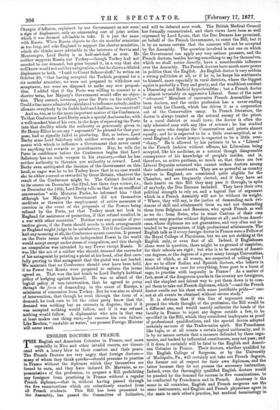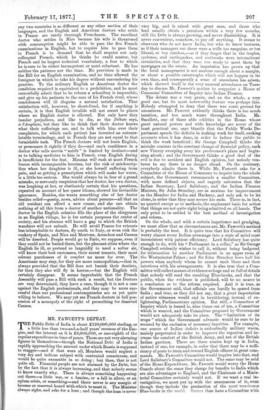ENGLISH DOCTORS IN FRANCE.
rimE-English and American Colonies in France, and more 1. 'especially in Nice and other invalid resorts, are threat- ened with a heavy blow to their comfort and their peace. The French Doctors are very angry that foreign doctors— many of whom they think quacks—should presume to practise in France without the diplomas which they themselves are foroed to earn, and they have induced Dr. M.arvaise, as re- 'presentative of the profession, to prepare a Bill prohibiting bay foreigner from practising in France without a regular Preach diploma,—that is, without having passed through the five examinations which are relentlessly exacted from all Preach students. This Bill has been presented to the Assembly, has passed the Committee of Initiative,
and will be debated next week. The British Medical Council has formally remonstrated, and their views have been so well expressed by Lord Lyons, that the Due Decazes has promised,
• n behalf of the French Government, to resist the Bill, but it is by no means certain that the measure will not be accepted by the Assembly. The question involved is not one on which the Government can apply any very serious pressure, and the French doctors, besides having something to say for themselves, which we shall notice directly, have a considerable influence over the Assembly. The French doctors have much more power in politics than the English. An English doctor is very seldom a strong politician at all, or if he is' he keeps his sentiments to himself, more especially in rural districts, where the biggest squire is probably a Tory and gouty, and the wealthiest resident a Dissenting and Radical hypochondriac ; but a French doctor is almost invariably an aggressive Liberal. Some of the most " advanced " Members of successive French Assemblies have been doctors, and the entire profession has a never-ending feud with the Church, which has driven it as a corporation out of the Conservative camp. In French literature, the doctor is always treated as the natural enemy of the priest. In a rural district or small town, the doctor is often the only educated man with any idea of science ; he has studied among men who despise the Conservatives and priests almOst equally, and he is expected to be a little over-sceptical, as in rural England a clever lawyer is expected to be a little over- " sharp." He is allowed by his patients to be a " Liberal " in the French fashion without offence, his Liberalism being accepted, like his medicine, as a natural though disagreeable consequence of his knowledge of people's insides, and is, therefore, an active partisan, so much so, that there are few Liberal Deputies returned who cannot reckon doctors among their influential constituents. They are as powerful as country lawyers in England, are considered quite eligible for the Chamber, and are frequently elected, and if they have set their hearts on this Bill they may pass it through, in spite of anybody, the Duo Decazes included. They have their own political strength to rely on, and a logical line of argument which in a French Assembly will not be without its weight. "Where, they will say, is the justice of demanding such evi- dences of skill and attainments from us, and not demanding them from Belgians and Russians, who speak French as well as we do ; from Swiss, who in some Cantons of their own country may practise without diplomas at all; and from Ameri- cans whose diplomas are not guarantees, and very often not in- tended to be guarantees, of high professional attainments. The English talk as if every foreign doctor in France were a Fellow of the Royal College of Physicians, but we are not striking at the English only, or even first of all. Indeed, if Englishmen alone were in question, there might be no ground of suspicion, for their schools are rigid ; but who is to be certain of Ameri- can degrees, or the degrees of a great many foreign Universities, some of which, at all events, are suspected of selling them? Are we to allow Italian and Spanish doctors, who believe in blood-letting as a cure for everything, from gout to a burst of rage, to practise with impunity in France ? As a matter of fact, most of the dangerous quacks in the country are foreigners, and the simplest and fairest way to put them down is to com- pel them to take out French diplomas, which "—and the French doctor swells out his cheat with some justifiable pride—" can- not at all events be obtained without severe study."
It is obvious that if this line of argument really ex- pressed the whole thought of the profession, theltill would be a different one, and would merely authorise the heads of the faculty in France to reject any degree outside a few, to be specified in the fill, which they considered inadequate as proof of professional qualifications and the special device adopted certainly savours of the Trades-union spirit. But Frenchmen like logic, or at all events a certain logical uniformity, and it is by no means certain that a measure defended by these argu- ments, and backed by influential eonstituents, may not peas • and if it does, it certainly will be fatal to the English and Ameri- can Colonies in France. Their doctors, whether qualified by the English College of Surgeons, or by the University of Mudopolis, Pa. will certainly not take out French degrees, the former out of respect for their own diplomas, and the latter because they do not possess the necessary instruction. Indeed, even the thoroughly qualified English doctors would be puzzled by the demand for success in five examinations, to be conducted by Frenchmen and in French. Anatomy is the same in all countries, English and French surgeons use the same instruments, and English and French physicians agree in the main to each other's practice, but medical terminology in
any two countries is as different as any other section of their languages, and the English and American doctors who settle in France are rarely thorough Frenchmen. The excellent doctor who settles in Nice because his wife is threatened with consumption might be able to pass the five French examinations in English, but to require him to pass them in French is to demand that he shall acquire not only colloquial French, which he thinks he could master, but French and its largest technical vocabulary, a feat to which he is sure to be either incompetent or most reluctant. He has neither the patience nor the time. No provision is made in the Bill for an English examination, and no time allowed the foreigner in which to take his degree without surrendering his practice. To the ordinary English or American doctor the condition required is equivalent to a prohibition, and he must sorrowfully admit that to be reborn a schoolboy is impossible, and give up his patients to the care of his French rival, whose condolences will ill disguise a natural satisfaction. That satisfaction will however, be short-lived, for if anything is certain, it is that English invalids will not resort to places where no English doctor is allowed. Not only have they insular prejudices, and like to die, as the Debats says, a 'Anglaise, but they like to think that their doctor knows what their sufferings axe, and to talk with him over their complaints, for which each patient has invented an untrans- latable terminology, and in French they are not equal to that formidable task. The French doctors will not learn English, or pronounce it rightly if they do—and one's confidence in a doctor who calls nerves " nairfs " is limited by instinct—and as to talking medicine to him in French, even English daring is insufficient for the feat. Mamma will rush at most French fences with incomparable heroism, but the risk of misdescrip- tion when her daughter is ill, or she herself suffering from pain, and so getting a prescription which will make her worse, is a little too serious. She would always be in fear of a grand mistake, or nervously suspicious that her doctor, her own doctor, was laughing at her, or obstinately certain that his questions, repeated on account of her queer idioms, showed his invincible ignorance. Besides, she wants something else of her doctor besides relief—gossip, news, advice about persons—all that an old resident can afford a new comer, and she can obtain nothing of all this from a doctor of another nationality. The doctor in the English colonies fills the place of the clergyman in an English village, he is for certain purposes the centre of society, and his absence will leave a gap to which the British wanderer will not submit. He will avoid France for retreats less inhospitable to doctors, fly south to Italy, or even risk the cookery of Spain, and Nice and Mentone, Arcachon and Cannes will be deserted. People would go to Paris, we suppose, even if they could not be buried there, but the pleasant cities where the English lie ill, or pretend so languidly to need a softer air, will know their best customers, their surest tenants, their most solvent purchasers of le comfort no more for ever. The Americans may stay, for they are more cosmopolitan,—that is, always provided that the Bill does not banish their dentists, for then they also will fly in horror,—but the English will certainly disappear. It seems improbable that the French Assembly will pass a Bill with such a result, but the Doctors are very determined, they have a case, though it is not a case against the English professionals, and they may be more suc- cessful than our professional contemporaries are as yet quite willing to believe. We may yet see French doctors in full pos- session of a monopoly of the right of prescribing for deserted Cannes.



































 Previous page
Previous page